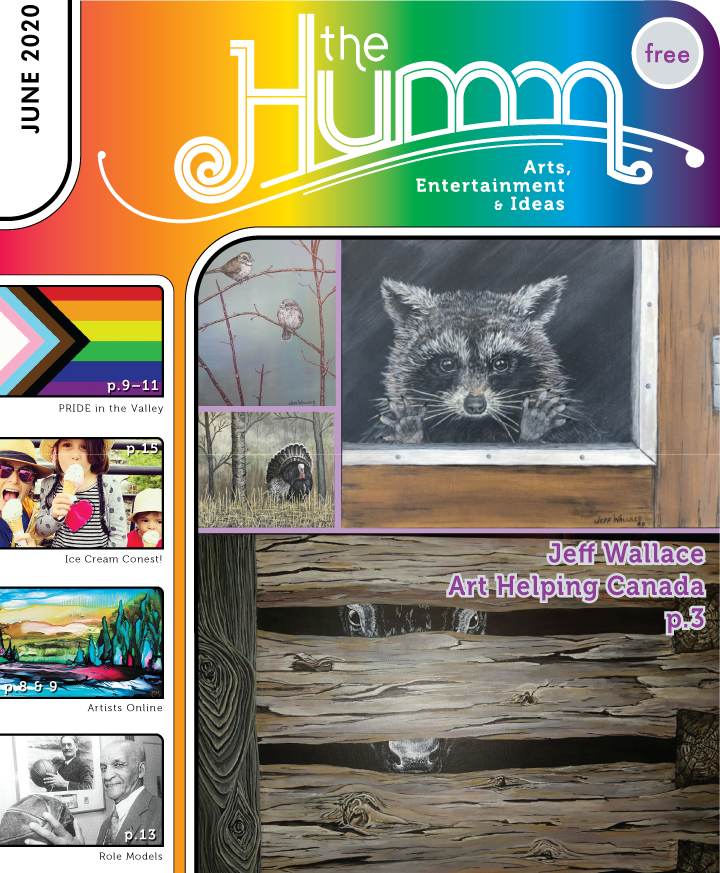Cinema Therapy, Books and Guided Meditations Finding Some Peace in a Pandemic - theHumm June 2020
Cinema Therapy, Books and Guided Meditations Finding Some Peace in a Pandemic - theHumm June 2020
By John Pigeau
In the midst of this dreadful pandemic, people are having to cope with all manner of new challenges. We’re a resilient bunch though, and so far many of us have improvised rather well. Meeting up for virtual happy hours. Baking loaves of scrumptious sourdough bread. Planting, watering and tending to our gardens, indoors and out. Like characters from a Dickens novel, we’ve taken to sewing, cycling, singing, painting and puzzling, reading and writing, drawing and dancing. To keep busy, yes, but also for comfort, distraction, and relaxation — and sometimes even for the joy it.
With Spring’s sunshiny arrival comes some more (possibly) good news: a few restrictions are lifting, and for most everyone that will likely be a truly welcome relief. But there remains a hard truth, and it is this: many folks — including seniors and people, like me, with underlying medical conditions — will need to remain isolated. And no one can really say for how long.
I know that’s an unpleasant thing to read. But it’s a reality. And please believe me when I say it’s also a very unpleasant reality to accept and endure.
I’m writing this on an overcast Friday in late May — my 81st day in self-isolation. It’s so strange to look out my front windows and think: out there is a deadly virus, and it’s looking for hosts. It feels like wartime. Except, as people have said (our Prime Minister among them), the enemy is invisible, and that’s possibly more frightening than the alternative.
Still, like most everyone, I’ve been trying to keep my chin up and do my best to find, in every day, some measure of contentment. That’s been tricky, I’ll admit. I live in an apartment without a balcony or green space. It gets claustrophobic. And with more folks out and about, especially on sunny days, it’s difficult to navigate the sidewalks, and get to a park or a shady spot by the water. It’s simply too difficult for many seniors and people with disabilities to safely duck and dodge our way about.
So, how to avoid the claustrophobia of “cabin fever”? And at the same time, how to not come to fear open spaces? How to not let loneliness get the best of you, or sink you into a deep depression? How to cope with isolation?
It’s complicated. And I know I’m not alone in this predicament. Others are feeling shut in too, and it can be dreadfully lonely.
“So, how are you managing?” my therapist asked me last we spoke on the phone. (We have a monthly phone appointment now.) “How are you coping?”
My first thought was to tell him that on several occasions I’d had terrifying feelings of unreality. Even during the day. In the mental health field, these frightening episodes of unreality are called “disassociation” or “depersonalization.” Mayoclinic.org describes dissociative episodes alarmingly well: “This involves an ongoing or episodic sense of detachment or being outside yourself — observing your actions, feelings, thoughts and self from a distance as though watching a movie (depersonalization). Other people and things around you may feel detached and foggy or dreamlike, time may be slowed down or sped up, and the world may seem unreal.”
I know very well why I’ve experienced these episodes of late — isolation. It’s that simple. And the spells of unreality are completely terrifying. Quite like the feeling of going mad, I would think. I do sometimes think that. But I’ve gotten through them. With a fast-acting medication (Ativan, that is) and self-talk that has eventually helped ground me. My mantra is fairly simple: “This is merely anxiety. It is harmless. And it will pass. It always passes.”
It’s helped me. So have guided meditations, but I’ll get to those in a bit.
Instead, “I’m watching a lot of movies,” I told my therapist. “Some for entertainment. Others just to pass the time, really. Nothing too intense or violent.”
It felt easier — starting off — to mention movies rather than to talk about feelings of unreality. That could wait.
It was basically “cinema therapy,” I told him. That’s how I thought of it, and that recently I’d been drawn to the smart, gentle, calming films in my collection, like The Accidental Tourist and Big, Mr. Holmes and The Lady in the Van, and a recent iTunes purchase, Knives Out. Every one of those films brings a smile to my face and puts me at ease. Quells my anxiety for a while. And I’m thankful for that.
“That sounds healthy,” my therapist said. (Let’s call him Dr. David.)
“It is, actually,” I said. “It’s sort of a mental rest.”
I told him I wasn’t sure precisely why — perhaps because most are set in space or on another planet — but some sci-fi flicks help quell my anxiety too. And some, a short list, are entertaining and clever: Arrival, The Martian, Prometheus, Contact.
A few disaster flicks do the trick, too, I told him; I’ve watched 2012, Twister, and The Day After Tomorrow numerous times of late. “I think that’s because I often think that right now I’m living in ‘survival mode,’” I said. “It is survival mode,” I added, to highlight the fact. “It’s definitely survival mode.”
“So, yeah …” I went on, “survival movies help me too; good ones, anyway.” I named a few favourites: Gravity, All is Lost, Arctic. “I can only watch Gravity during the day though,” I pointed out. “It’s a bit too intense for pre-bedtime viewing.”
Dr. David laughed. Then he said, “All of that makes perfect sense. It sounds like you know what you’re doing. And why. And that’s important. Both of things are healthy and important.”
“Yes,” I agreed. Then I told him, “At night, I know I need to unwind and quiet my mind. That’s when I’ll watch a good, old-fashioned popcorn flick.” I named a few that came to mind: Super 8, Tomorrowland, The Finest Hours, Jurassic Park.
We both agreed that good entertaining distraction is healthy and necessary, a balm for a busy mind.
“What about reading?” asked Dr. David. He knows me well by now — that I’m a journalist and an author, used to own a bookshop, and that I love to read. He does too, I’ve come to know, so it’s something we enjoy talking about during our sessions.
“Yeah, that’s been a bit tough,” I admitted. “I’ve been reading but finding it difficult to focus. I read a few pages then just lose focus. My mind drifts off. I can’t concentrate.”
“That’s certainly understandable,” Dr. David told me, and then he listened to why I thought so too — that it was often a matter of mental exhaustion, a cumulative fatigue brought on by prolonged anxiety, fear, isolation, loneliness. And he said that, yes, sounded about right.
“I typically shut my eyes then,” I explained, “and if I’m fortunate, I’ll end up drifting off into a restful nap. When I wake up, I normally feel refreshed. It’s weird,” I said.
“Not at all, John,” Dr. David assured me. “That sounds like a very common stress reaction.” After a pause, he asked, “And what sort of stuff are you reading?”
I was happy to tell him I’d purchased a book he had highly recommended, last we’d talked: Erik Larson’s The Splendid and The Vile. “You were right, it’s completely compelling and startlingly well written. It reads like a fine novel, actually.”
“Oh, excellent. And yes, it does, doesn’t it?”
“Yep. Very much so. And because it’s so compelling it holds my attention. I can read about five pages at a time, that is.”
The book, by the way, is an absorbing, intimate account of Winston Churchill’s first year as Prime Minister of England; beginning with the evacuation of British Forces from Dunkirk, after which a Nazi invasion of London seemed imminent. I told Dr. David that I’m not normally one to read long books — at 503 pages, this one’s a heavy hardcover — and that it felt like a small victory, too, that I’d yet to doze off while reading it and have the book bonk me on the head.
He laughed. I did too.
“Hey, it used to happen to me a lot in university,” I told him. “The struggle is real.”
Dr. David laughed again, a little more robustly.
“I’m also reading a book called Journal of a Solitude,” I told him. “I’m reading it for research but also out of interest. It’s not an easy book. It’s a go-to, though, for people wanting to read about solitude.”
It was interesting, I told him, because May Sarton, the book’s author — a poet and a novelist — writes about needing and cherishing her solitude, but at the same time she experiences frequent depressions and bouts of loneliness. “My take on it,” I said, “is that solitude is not so easy, but it can also be quite wonderful. Treasured, even. And right now seems a good time to be reminded of that.”
“Hmm,” Dr. David said thoughtfully, and then we talked about solitude for a while. He asked me the author’s name again, and I told him. He was writing it down, I knew.
“And for pleasure,” I said, “I just finished Anne Tyler’s latest, Redhead by the Side of the Road, and it was beautiful, a delight, as are all her books. Though it was much shorter than most of her work.”
He knows Anne Tyler is my favourite author. I adore her warm, wise, welcoming style, her quirky characters — quirky but very ordinary — and her kind, gentle eye on the world.
“She couldn’t have picked a better time to release a new book,” I told him. “I just wish it wasn’t so short. I’ll have to read it again soon.”
“Sounds like a good idea,” Dr. David said. “Especially since you enjoy her books so much. Finding pleasure in a book is much better for the mind than merely being distracted by one.”
“Big time,” I said. “I think so too, that is.”
Then Dr. David asked me what else I was doing to manage. Was I getting out for walks? Talking to friends at all? And how was I sleeping? He repeated something he normally asks me in every one of our sessions: “Are you protecting your sleep?”
This is where things were particularly tricky, I told him. I talked to friends quite seldom because, frankly, I have a small circle of friends and most of them have families or are coupled off, and they work and they’re generally busy people. They don’t have much time for chats, unfortunately. As for walks, no, not so much. “I do walk to Shoppers Drug Mart to get groceries one morning a week,” I told Dr. David. “Wearing my cotton mask and gloves and all, but other than that, no, I don’t feel particularly safe walking around where I live. And now there are more people about, some people completely unaware of social distancing, so it’s tough — I can’t skip across the street so easily. And honestly, I find it frightening. It makes me really anxious. Other people do, that is. The ones not abiding safety protocols. People sweeping right by me.”
That was unfortunate, Dr. David said, but he understood; he’d certainly had to deal with the same sort of people when he was out. Still, he urged me to try to get out more, maybe early in the morning before too many people were out. And walk on a quiet side street, if possible. “Remember,” he said, “you don’t need to have a destination, John. Just go for a walk. It’s good for the body and the mind.”
“I’ll try,” I said, uneasily. “I am feeling really shut in and cooped up. Some days I don’t talk to anyone, not a soul — except my mom, maybe, on the phone. I typically call her three times a day or more, just to check in and chat. Otherwise, it’s been very, very hard… the lack of human contact and connection.”
“Of course,” Dr. David said. He reminded me that from an early age our minds are wired that way; human beings need those connections, every bit as much as we need food and water and exercise.
I had good news, though: I’d recently discovered a remarkable series of guided meditations on the Calm app on my iPhone, namely ones by an American mindfulness teacher named Shinzen Young. His voice is what drew me to him — it’s warm and warbled and immediately charming. “His voice alone soothes me and could very likely lull me to sleep,” I told Dr. David, and he laughed.
“His teachings are a mix of Buddhist teachings, mindfulness techniques, and neuroscience. Long ago, he was an ordained monk. And I think he worked with Leonard Cohen,” I said. “At any rate, his one guided mediation is called ‘Untangling Physical Pain’ and it not only alleviates my physical pain but quells me anxiety and helps me sleep too. It feels like sort of a miraculous discovery, really.”
“It sounds like one,” said Dr. David. “Good for you. I’m glad that’s helped you.” He sounded genuinely glad.
“And on another level,” I told him, “they sometimes help me feel less alone. Like I’ve a friend I can count on to be there — when the pain in my back and my legs is really awful, when I’m most anxious, and when I desperately need sleep. He’s there. With different meditations, too, not just the one.”
“Excellent,” said Dr. David.
“It is,” I agreed. And I might have teared up then.
Eventually, we turned to the difficult topic of my feelings of unreality. They had terrified me. Dr. David said he could certainly understand why. But medication helped, I told him, and I was able to re-orient and calm myself. The episodes hadn’t lasted too long, thankfully. “But it’s clear,” I said, “this isolation is getting to me. It’s been mentally exhausting.”
Dr. David heard me loud and clear. He then recommended a regimen of things for me to do and practice, every day: get out for a walk, talk to a friend on the phone (no matter how hard that might be), eat nutritiously, rest when I felt the need, keep listening to the guided meditations, protect my sleep, and practice the cognitive behavioural tools and breathing exercises he and I had worked on for the last few years. “Use them every hour,” he said. “Keep ahead of the anxiety. You can do it. Just remind yourself. Every hour. Use the tools,” he said. “They work.”
I nearly teared up then. I said thank you. They did help.
I was grateful we’d had this chat. Grateful to hear Dr. David’s caring voice. Grateful for his expertise and reassurance. And grateful to be heard.
I’d do my best, I told him.
***
A friend on social media recently wrote: “If one more person tells me to start meditating, I’m going to scream!” I had to laugh at that, as I know the feeling; I don’t like to be preached at either.
So, I will not make any suggestions to you, the good folks reading this.
Movies, books, and meditations are but three very important things that have helped me in these the hardest of days. I’m thankful to have these things in my corner, so to speak; I can count on them. I know that now. And so I’m working, too, to use them when needed, knowing that all I need to do right now is to just be.
And whatever helps you just be, may you also find some peace.
Where to Find the June Humm - theHumm June 2020
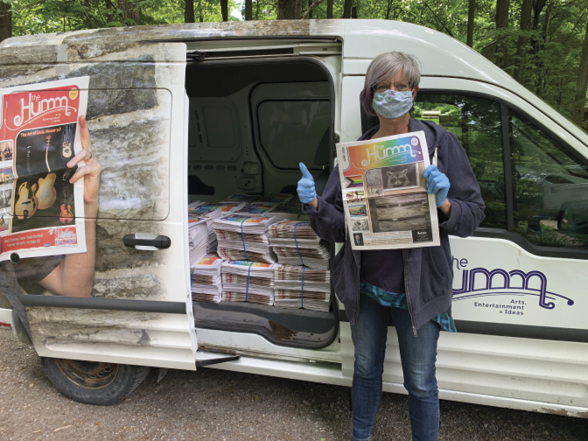
We’re heading out to deliver the June issue of theHumm! Because things have changed a wee bit since the last time we did our distribution, here’s a list of the places we will be trying to deliver to. Hours and more information can be found at the links. Happy Humm hunting!
Almonte:
Dandelion Foods dandelionfoods.ca
Don’s Meat Market donsmeatmarke......
Jeff Wallace — Wallflower Turned Art Auctioneer! - theHumm June 2020
By Sally Hansen
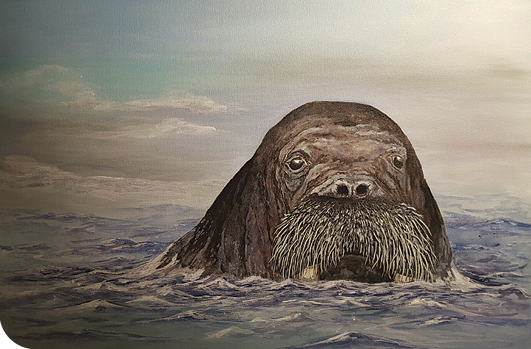
Art… and Soul
A new artist is blossoming in our midst. Rising to the COVID-19 challenge, Burnstown artist and businessman Jeff Wallace is discarding his anonymity and charging into the fray, determined to make a positive contribution. But first, introducing:
Jeff Wallace — Artist
Wallace has only recently arrived in a place in his life where his first love, art, is able to play a bigger role. As Forrest Gump’s mama always said, “Life is like a box of chocolates. You......
COVID, Kids, & All the Feelings - theHumm June 2020
By Nicki Gallo
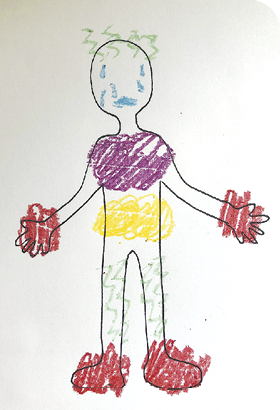
There’s this exercise that I like do when I work with kids. It helps us to explore how our feelings are something that we experience in our bodies as well as our minds. First, I give the child a piece of paper with the outline of a person. I ask them to colour the location on the body where they feel certain emotions and match it with a colour. For example, they may feel red/anger in their hands: “I’m so mad I could punch someone!” Or feel yellow/nervousness in their bellies: “I have b......
Supporting Local Artists: In Person and Online! - theHumm June 2020
By Miss Cellaneous
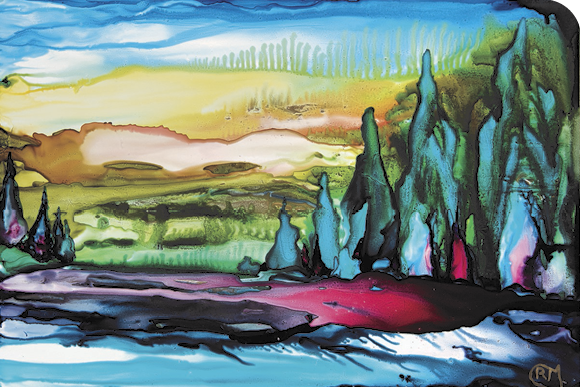
The good news for area art lovers is that many local galleries have been able to re-open — most with reduced hours and all with extra safety precautions in place. We highly recommend a visit to Almonte’s General Fine Craft generalfinecraft.com and Sivarulrasa Gallery sivarulrasa.com , Riverguild Fine Crafts in Perth ...more
PRIDE of Place An interview with Michael Rikley-Lancaster - theHumm June 2020
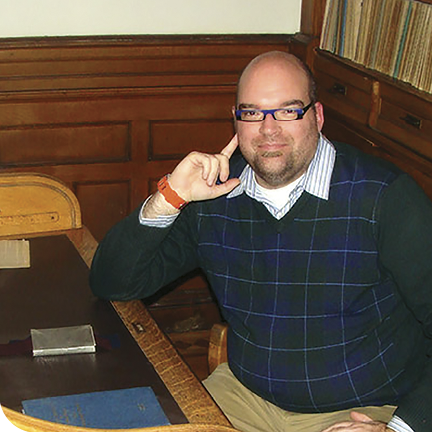
Michael Rikley-Lancaster is the Curator of the Mississippi Valley Textile Museum and a member of the group that was planning to launch the first-ever Mississippi Mills PRIDE Week this June. We contacted him to find out how both the Museum and MM Pride are faring.
theHumm: Since becoming Curator, you (with the assistance of your staff, board and numerous volunteers) have made many improvements to the Museum and have hosted incredible exhibitions by artists from......
Talking Transformation An interview with Noé Charron - theHumm June 2020
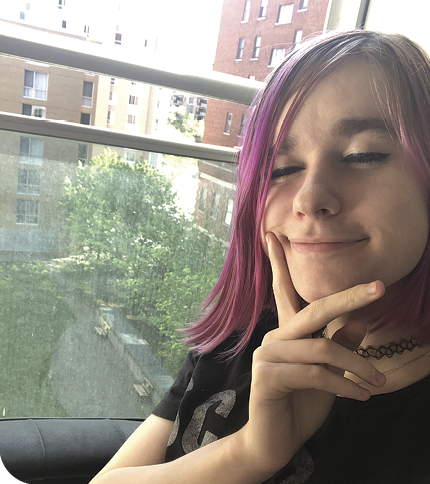
Noé Charron is a 22-year-old non-binary trans woman (who uses both she/her and they/them pronouns) who started her transition while growing up in Almonte and working at Baker Bob’s. We contacted her to find out how her transitioning was perceived and received by the community, and what advice she has for people who want to try and foster a more welcoming and compassionate atmosphere.
theHumm: As an employee at Baker Bob’s, you were one of my only examples of someone who......
Embers of Hope Embracing Life in an Age of Ecological Destruction and Climate Chaos - theHumm June 2020
By Kris Riendeau
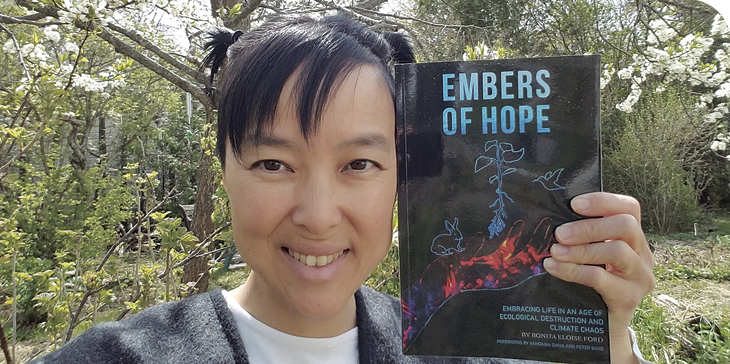
Bonita Ford is a co-founder of Permaculture Eastern Ontario and author of the new book Embers of Hope: Embracing Life in an Age of Ecological Destruction and Climate Chaos. We contacted her to find out how this book came to be, and how she hopes it can help us all to “nurture the small forces that may radically transform our world”.
theHumm: You had me from the title, because hope seems to be one of the most precious “commodities” — albeit one that isn’t for sale ......
Ice Cream Contest!Play “Passport to Brain Freeze” - theHumm June 2020
By Sarah Kerr
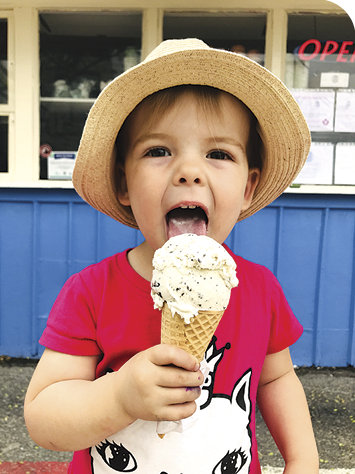
Hello again friends! I hope you and your littles are ready for a 3-month summer “vacation”. But one from the ’50s without camps, daycares or programmed sports… and for many, juggling working from home. Sounds idyllic, right? Okay, this doesn’t exactly sound like vacation, but if there’s any advice that I can offer it’s that the summer of quarantine begins now!
Yes, you may be wondering if I’m the minister of education to declare something like that, and to be clear… no I am not. But as the d......
Almonte, Spirit of Place A New Book from Photographer John McQuarrie - theHumm June 2020

John McQuarrie is a photographer and publisher of the recently released book Almonte, Spirit of Place. We contacted him to find out how his most recent book came to be, and how the current lockdown is affecting its reception in the community.
theHumm: Your photos are stunning — can you tell us a bit about your training and background?
John McQuarrie: Like many working photographers, I simply consumed print and online tutorials along with each advance in imaging......
A Time of Transformation - theHumm June 2020
By Kris & Rob Riendeau
Welcome back to the print version of theHumm! We are thrilled to return to this format, and we sincerely hope that this issue finds you well. As you might imagine, it is a bit different from our ......
Faces & Fabric of a small town during pandemic - theHumm June 2020
As the community grapples with a pandemic that is radically reshaping every aspect of public and private life, we are striving to capture the historic shift through the eyes of everyday people in M......
Lots of Time to Plant! - theHumm June 2020
By David Hinks
Missed planting the vegetable garden on the May 2-4 weekend (well it was a bit early this year)? Do not despair if you haven’t planted your entire vegetable garden yet. It is not at all too ......
KITCHEN at Sivarulrasa Gallery An Exhibition in Partnership with the Carleton Place & Beckwith Heritage Museum - theHumm June 2020
Until July 10, Almonte’s Sivarulrasa Gallery is pleased to partner with the Carleton Place and Beckwith Heritage Museum to present KITCHEN, an exhibition that elegantly combines wo......
Rural Root Zooms into Spring with Couples - theHumm June 2020
At its best, community theatre brings together people from all walks of life to share ideas and create friendships. This has been Rural Root Theatre’s strength since 2005, and they have no intent......
PRIDE in the Valley! - theHumm June 2020
Here’s an overview of PRIDE plans (as of press time) across the Ottawa Valley. We recommend following these groups on Facebook, because things may change and activities may be added as it becomes......
Role Models for Rough Times James Naismith and John McLendon - theHumm June 2020
Just as we were going to print, stories about the death of George Floyd started hitting the news and social media. theHumm doesn’t report on breaking news, but we thought this information about a......
Bike Boom The Resurgence of Cycling in Uncertain Times - theHumm June 2020
By John Pigeau
Following a national trend, business at local bike shops is booming.
“A hundred percent, absolutely,” says Pete Wood, owner of Heritage Bikes in Perth. “A lot of people are finding that......
“Trishaw” Crowdfunding Campaign Launched - theHumm June 2020
With support from Lanark County Council and several local businesses, Cycling Without Age Lanark County (CWALC) has taken the next step by launching a $7,000 crowdfunding campaign with the goal o......
Back to the Books! - theHumm June 2020
By Karen DeLuca, Librarian
The past few months has certainly been posing a challenge to readers everywhere.
For some it has meant exploring those long-forgotten books neatly displayed on bookcases at home. For others ......
Enough’s Enough! - theHumm June 2020
By Glenda Jones
We’ve been behaving ourselves and “staying the blazes home” for the past twenty-eleven weeks. It’s been fine up to this morning, when I scared myself half to death looking in a mirror. Who kidnap......
We are All in this Together - theHumm June 2020
By Wanda MacDonald
In small communities like ours, you just need to ask for help and people step up. And everyone is definitely doing just that!
Mississippi Mills Together — or MMTogether for short — is one wa......
The Power of Tech Shabbats - theHumm June 2020
By — Kris Riendeau
Back when COVID-19 was just a gleam on the social media horizon, Rob and I listened to an intriguing podcast while delivering the February issue of theHumm. Presented by The Long Now Foundation, ......
Food Truck Evolution - theHumm June 2020
By Sebastian Weetabix
Months ago Weetabix asked his loyal readers “what starts with ‘F’ and ends with ‘uck’?”, and the correct answer had no apparent connection to the spread of a virus or a fundamental change in the ......
Cinema Therapy, Books and Guided Meditations Finding Some Peace in a Pandemic - theHumm June 2020
By John Pigeau
In the midst of this dreadful pandemic, people are having to cope with all manner of new challenges. We’re a resilient bunch though, and so far many of us have improvised rather well. Meeting up ......
Business-to-Business Support A Full-Circle, Feel-Good Story - theHumm June 2020
By the Fulton’s team
When Shirley Fulton-Deugo, owner of Fulton’s Pancake House & Sugar Bush, got together with the team from Almonte’s Dairy Distillery, little did she know great things were in the makin......
Jul 18 Multicultural Potluck
Jul 18 Multicultural Potluck
Jul 18 Multicultural Potluck
Jul 18 Multicultural Potluck
Jul 18 Multicultural Potluck
Jul 18 Multicultural Potluck
Jul 18 Multicultural Potluck
Jul 18 Multicultural Potluck
Jul 18 Multicultural Potluck
Jul 18 - 27 Bloomfest Garden Art Show & Sale
- Jim Fisher — Popularizing Art
- Back by Popular Demand Almonte Craft Beer Fest Returns on July 25
- Have You Heard this Joke Before?
- Celebrating Elder Trees in Perth
- Stewart Park Festival Full Lineup and Super Schedule for 2025!
- 5th Merrickville Festival of the Arts A Marvelous Mix of the Arts from July 25–27
- HerbFest Returns A Celebration of Healthy Living, Music, and Local Flair
- BarnDoor Productions Bringing Summer Shakespeare Back to Perth
- A Community Yart Sale!
- Transform Your Garden with Art From Birdhouses to Bold Sculptures — Find them at Bloomfest!





